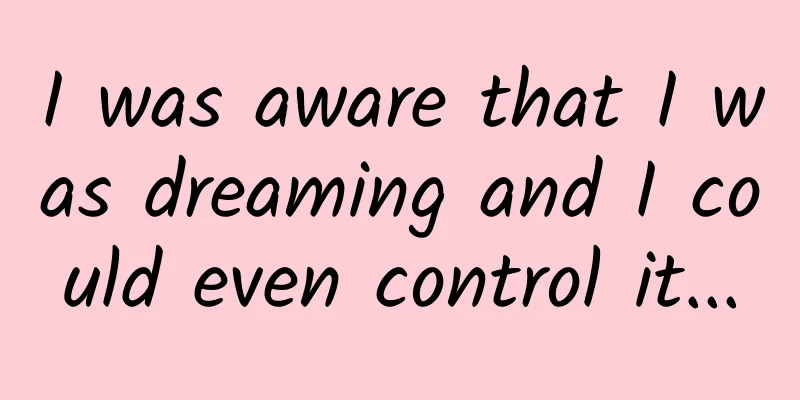I was aware that I was dreaming and I could even control it...

|
Dreaming is a confusing, hazy experience that is often characterized by decreased rational thinking, fewer or no real memories, and heightened impulsivity and emotions—all of which often leave us confused when we wake up in the morning. But dreams don’t always appear in this form. More than half of people have at least one moment in their lives when they realize they are “dreaming” and, in some cases, can direct their dreams—what’s called a “lucid dream.” Nearly a quarter of people say they have lucid dreams once or more a month. Lucid dreaming, fun and useful Lucid dreams appear to be associated with two key changes in the brain. One is the frontotemporal cortex, a structure that controls our higher-order cognitive abilities. It is suppressed during normal dreaming, but it is more active during lucid dreams. The other is gamma waves. Researchers have also observed an increase in gamma waves during lucid dreams, which are caused by groups of neurons firing synchronously, and the frequency of their firing is associated with conscious awareness and executive functions (such as autonomous behavior and decision-making). Scientists are interested in how to get the brain into a lucid dream state. Not only is it interesting, but they also hope that lucid dreams can provide valuable information about how consciousness is formed or its practical uses in many other situations. For example, lucid dream therapy has great potential for patients who suffer from long-term nightmares and post-traumatic stress syndrome (PTSD). PTSD patients often have nightmares, which usually revolve around a single traumatic event. They are recurring and terrifying, causing anxiety, insomnia, and restless sleep, which affects normal daytime activities. Lucid dreams can make nightmare patients realize that what they are experiencing is just a dream, not a real event; then, nightmares are transformed into positive or ordinary dreams. Lucid dreams can make people realize that nightmares are just dreams Lucid dreams can also help improve motor skills through imagination. Research shows that using mental imagery to practice movements can help athletes, doctors, and musicians perform better, and it can also help with rehabilitation of hand control and other motor tasks after neurological damage. This works because imagining doing an exercise activates almost the same neural structures as actually doing it—even when the action is in a dream. Three tips to help you have a lucid dream In recent years, many methods have been developed and tested to induce lucid dreams. Although no method has yet been proven to reliably and consistently induce lucid dreams in everyone, that doesn't mean they won't work for you. Although research in this area is still in its infancy, there are some methods that give us hope. Here are some of the most promising methods, most of which you can try at home. Cognition basically occurs when you are awake or about to fall asleep. At present, this is the most successful method for inducing lucid dreams. A recent study tested 169 subjects from Australia and found that a combination of the following three techniques can most effectively induce lucid dreams. These three methods are: reality testing, Mnemonic Induction Lucid Dreaming, and Wake-Back-to-Bed. The reality test is to habitually ask yourself when you are awake whether you are dreaming, and take some actions to help you find out. The spinning top in the movie "Inception" refers to this technique: when you are awake, the spinning top will eventually stop; but in dreams, it will continue to spin forever. If you don't like to carry a spinning top in your pocket, you can pinch your nose and try the supposedly impossible task of breathing through a pinched nose. If you repeat this test during the day, you are more likely to do the same thing in your dreams; when you find that you can actually breathe through a blocked nose, you will realize that you are dreaming and become lucid in a freer dream world. The spinning top in Inception In lucid dream mnemonic deduction, you practice staying lucid in your dreams while repeating a statement with the same intention, such as, "The next time I dream, I will remember that I am dreaming." For best results, you can also use this trick in conjunction with the lucid fall asleep technique when you take a nap. For example, you can set your alarm for an hour or two before you normally wake up, wake up a few minutes later, and then go back to sleep. Researchers believe that this brief awakening is related to rapid eye movement (REM) sleep, the stage of sleep during which we have vivid dreams, and that brief awakenings increase cortical activation in key brain regions associated with lucid dreaming when we re-enter REM sleep. Naturally, hitting the "snap" button on your phone alarm multiple times before getting out of bed also seems to increase the chances of having a lucid dream. Wake up routine: press "Snooze" and then go to sleep nervously Of course, these methods require continuous practice to work. In order to find a simpler way to lucid dream, many wearable technology companies have developed small devices that can flash, vibrate or play sounds during REM sleep. Developers believe that these external stimuli will be incorporated into the content of the dream, thus reminding the dreamer that you are dreaming. However, both the literature and my own experience in the sleep lab at the University of Essex suggest that these external stimulation devices need to be used with caution. If used incorrectly, stimulation will not be incorporated into dreams; or worse, it can wake people up. Some people are lighter sleepers, so the intensity of these stimulations should be tailored to each person's specific threshold for waking up. In addition, these stimulations should occur at specific times in REM sleep, when the brain is most alert and receptive, so that they are most effective. Unfortunately, current wearable technology does not take these factors into account, and research has not yet fully explained how we can use these stimulations effectively. Vibrations like this are obviously not appropriate. Recent studies suggest that drug interventions may be effective, such as galantamine, an enzyme inhibitor commonly used to treat Alzheimer's disease. The study found that when used in combination with lucid dream memory derivation and lucid resleep, the drug can significantly increase the rate of lucid dreams. However, people who want to have lucid dreams should avoid using prescription drugs, firstly because the research is still in its early stages, and secondly, the drugs may have side effects. There are other dietary supplements and herbal remedies that claim to increase the chances of lucid dreams, but they should also be used with caution. There is no scientific evidence to support their effectiveness, and, like all medications, their use carries the risk of allergic reactions and side effects. Use medications with caution! Our understanding of lucid dreaming has advanced greatly over the past decade. There is still a lot of research to be done; hopefully, soon we will figure out how to reliably and consistently lucid dream. We will see. Compile Source https://theconversation.com/im-a-lucid-dream-researcher-heres-how-to-train-your-brain-to-do-it-118901 Author: Achilleas Pavlou Translation: Amaranth Editor: Li Zi Li Zi SMS, Mai Mai An AI I want to control dreams because only in dreams can I have everything. The copyright of the translation belongs to Guokr and may not be reproduced without permission. If necessary, please contact [email protected] |
>>: Burn My Calories: Why can’t I lose weight even though I exercise every day?
Recommend
Why doesn't the MacBook Air have a Retina display?
Another Apple product launch has ended, and we st...
Shi Zongyuan: What are the precautions for Chongqing SEO optimization to exchange friendly links?
SEO optimization of friendly links is very import...
A complete plan for promoting online events!
How to plan an online event? Even those who are j...
Rich text editor implemented using UITableView in iOS
Preface The company recently did a project, one o...
Have you been too sweet? Please check these blood sugar knowledge
Improving the scientific literacy of all citizens...
Account self-diagnosis model
Account Self-diagnosis Model Resource Introduction...
Creative advertising materials for the Meiyu Women’s Platform!
As women’s education and employment levels improv...
GlobalData: Covid-19 will not slow down 5G deployment
Data analysis company GlobalData said that despit...
The colorful black, the ever-changing white, the brilliant green... have been passed down for 100,000,000 years?
Audit expert: Luo Huiqian Associate Researcher, I...
On the first day of I/O, Google released its own Siri, Skype, WhatsApp and Echo | Geek Early Knowledge
On May 18, local time in the United States, Googl...
To do Zhihu traffic promotion, you must master the skills!
There is no project that cannot be handled by tra...
Comparison of the Fluency of iOS7.1 on Various iPhone Generations
After the release of iOS7, many old iPhone users s...
【Marketing Case】10 April Fools' Day Creative Marketing Cases✔
Let’s take a look at the new tricks of brands on ...
What are the information flow optimization techniques? Leave it all here!
Account optimization refers to the process of con...









